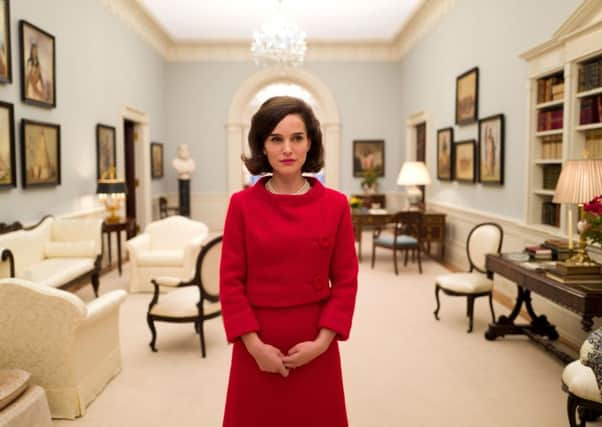Film reviews: Jackie | Lion | Cameraperson


Jackie (15) ****
Lion (PG) ****
Cameraperson (15) ****
Chilean director Pablo Larraín is about as fine a filmmaker as anyone currently working. His CV thus far has been filled with impeccably crafted, artistically audacious films such as Tony Manero, No and last year’s The Club – movies that burrow into the psychology of his native country and its troubling relationship with history, particularly the political establishment’s efforts to wipe out its opponents or expunge any record of its crimes against the people. For his debut English-language film he’s working from a slightly different impulse. Delving into the assassination of John F Kennedy, Jackie explores history literally in the making by filtering this world-shattering event through the prism of the First Lady in the days following her husband’s murder.
As such, don’t expect a comprehensive biopic of the wife, mother, widow, tastemaker and White House style icon. This is a rigorous exploration of Jackie Kennedy’s steely determination to construct, in the face of incomprehensible grief and suffering and post-traumatic-stress disorder, an overarching narrative to protect and sustain the legacy of her slain husband, who’d barely been in the job long enough to accomplish anything of substance. That makes it a great showcase for Natalie Portman. Women in movies about American presidents invariably take a backseat to those power-mongering their way through the West Wing, but here all eyes are on Jackie; a nation’s shock frozen in the angry, confused, defiant glare Portman adopts as she plays this newly widowed mother of two confronting the world’s press in blood-spattered Chanel. Portman’s performance is sometimes stiff and mannered; her accent – like her real-life counterpart – a curious blend of breathy winsomeness and patrician elegance. But she also lets her poise crack just enough – and sometimes quite a lot – to ensure we never forget there’s a human being behind, say, the professional hostess who invited cameras into the White House for a televised tour of the First Family’s residence. Larraín recreates that famous broadcast in the film and the way he crosscuts the black-and-white footage going out to the nation with the behind-the-scenes orchestration that made it possible hints at the extent to which the idea of “Jackie” itself was a performance, a knowing construct designed to make the glamorous wife of the 35th president accessible to the masses in a country yet to view art and culture and education with the fear, suspicion and disregard it does now.
Advertisement
Hide AdInevitably Larraín also has to recreate the assassination and while he doesn’t stint on the horror, the film doesn’t feel exploitative either, largely because he keeps the focus on a flesh-and-blood person reacting in the moment to a terrible crime. But Portman’s performance, and Larraín’s approach, is welcome too for the way it studiously avoids presenting Jackie as a victim, as someone trapped by circumstance in a role she’d rather never have had. Framing the film as an interview between the widowed Mrs Kennedy and an unnamed journalist, Larraín uses this fairly conventional device to jump around the timeline of Jackie’s life. (It’s reasonable to assume the journalist in question – despite being played by Billy Crudup – is supposed to be Theodore H White, the Life magazine writer who conducted a four-hour interview with the First Lady a week after the assassination.) Blurring history with myth, Larraín deconstructs how those two things fuse together and how central a part the First Lady – whacked out on grief and various medications – played in the creation of the enduring Camelot myth. This gives the film an artfully off-kilter feel, one enhanced by Under the Skin composer Mica Levi’s warped, glissando-heavy score, which sets the tone perfectly for a film and a performance that slides beautifully between tragedy and resilience, hitting grace notes aplenty in between.
Lion sees Dev Patel finally come of age as a leading man in the almost unbelievable true story of Saroo Brierley, who used Google Earth to try and track down his real family after being separated from them as a five-year old boy in India. Growing up in Australia after being adopted by an altruistic couple (played by Nicole Kidman and David Wenham), his story – directed by Garth Davis (TV’s Top of the Lake) – is split into two halves, with the first detailing his traumatic separation (first-time actor Sunny Pawar is brilliant as the young Saroo) and the second his sense of incompleteness as a young man with no idea of who he is or where he came from. His feelings of displacement – triggered by a Proustian flashback at a dinner party – can’t help but put his relationships with his girlfriend (Rooney Mara) and adoptive mother (Kidman) under strain, but the film does well at integrating domestic drama with his increasingly complex feelings about his own identity. This is the sort of true story that catches you unawares, even if you know (or think you know) where it’s going.
Finally this week, the excellent Cameraperson is a brilliantly conceived audio-visual memoir of cinematographer Kirsten Johnson, ingeniously comprised of footage compiled from numerous documentaries she’s shot over the last 25 years, among them Fahrenheit 9/11 and Citizenfour. Offering very little context, and no explanatory narration, her voice comes through instead in literal form via her off-camera interactions with her myriad subjects and directors and, more figuratively, through the images she shoots.
The effect is entrancing: an expressionistic portrait of the itinerant lifestyle her career dictates and a subtle exploration of the ethics and practices involved in documenting the world in a truthful way. ■